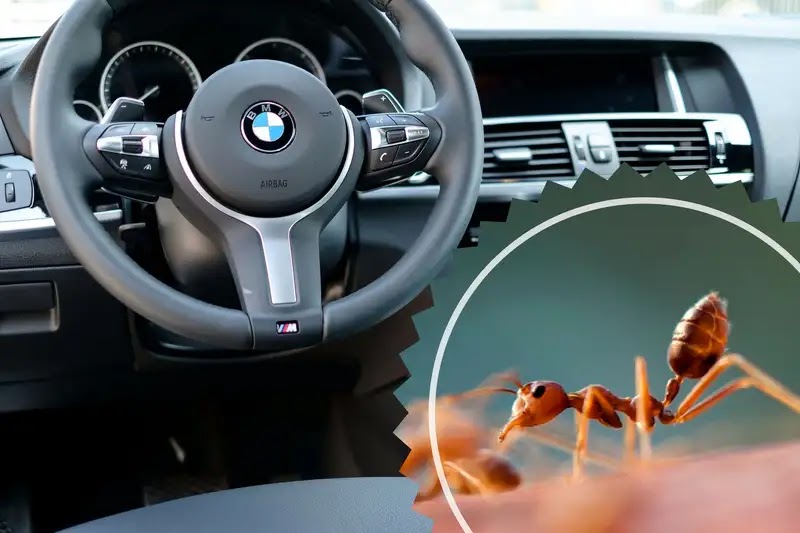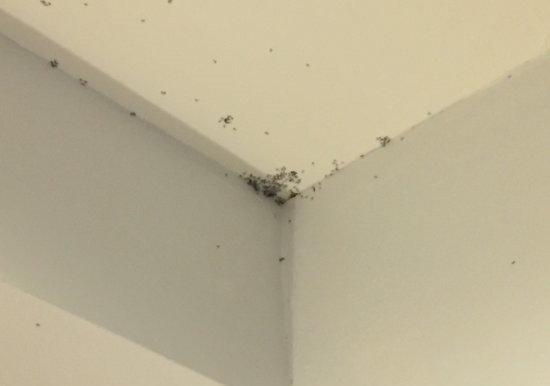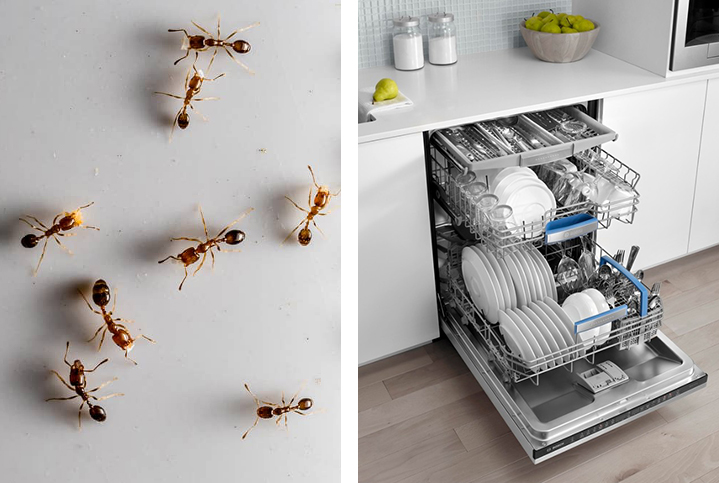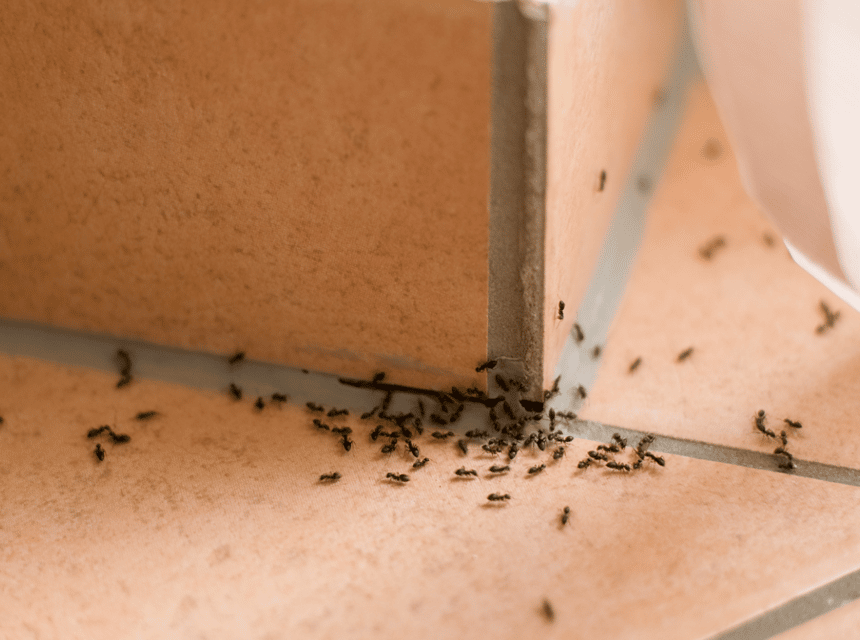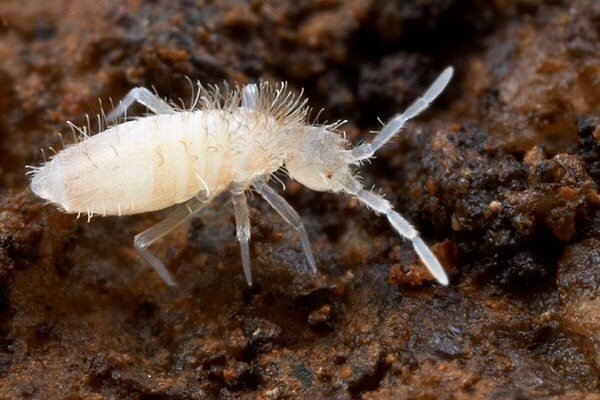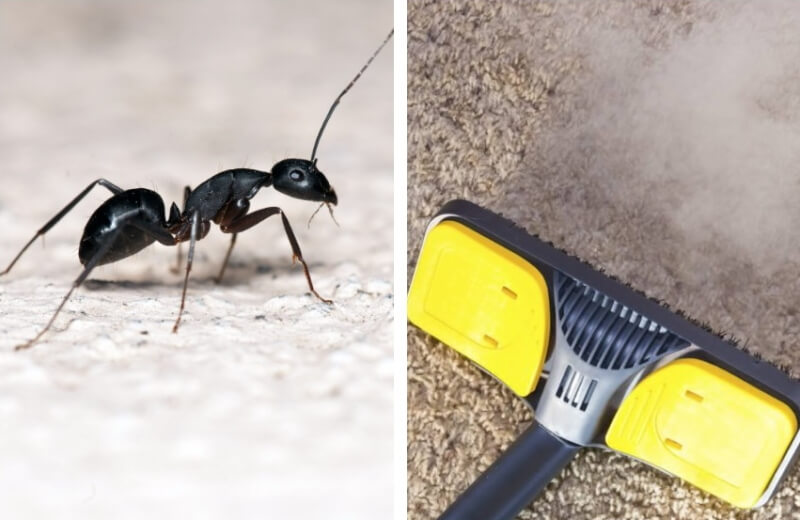

If you are seeking information about how to get rid of ants in electrical outlets, you have come to the right page. You also might be quite worried about what kind of damage ants can do to your electrical wires once you see them crawling out of your electrical sockets or light switches. Also, don’t think that you don’t have a problem if you see just one or two ants. Ants can gum up, switch a socket, and actually chew through your electrical wires, causing power outages. They can also creep along wires, get electrocuted, and have their bodies pile up behind walls, if they are odorous ants, sometimes called piss ants, a smell like ammonia or rotten coconut could foul the air. If you detect a smell, then you might want to check out this article Trusted Source Odorous House Ants – Wisconsin Horticulture Odorous house ants (Tapinoma sessile) can be found across the United States and are one of the most common ants found in and around structures in Wisconsin. These ants are known for their fondness for sugary foods and their distinctive odor when crushed. hort.extension.wisc.edu about odorous house ants.
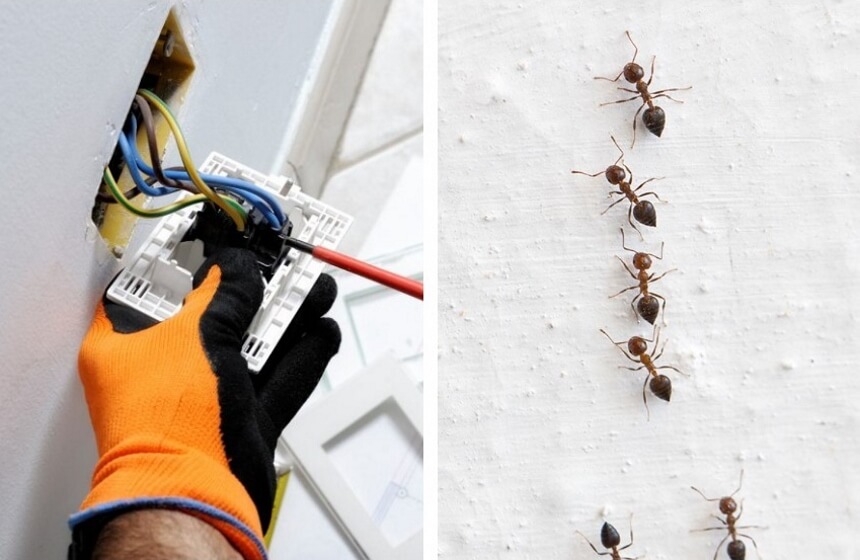
There are three types of ants that love to make their nests in electrical outlets: sugar ants, crazy ants, and carpenter ants.
Sugar ants enter your home through holes or cracks, often following a pioneering ant that leaves a trail of pheromones. If you really want to attract a horde of sugar ants into your house, do something like leave your toaster full of breadcrumbs. The sugar ants will likely find their way into your kitchen through the outlet that the toaster is plugged into and in and out of the toaster. Sugar ants are also drawn to running water, so they are common around the kitchen sink, laundry, or bathroom. If you are wondering how to get rid of sugar ants in electrical outlets, it is a good idea to unscrew the outlet plate to see how bad the problem might be, and if it is packed with ants, turn the power off and call an electrician.
These ants are tiny, less than 18th of an inch. They love to swarm in great hordes through your home’s wiring and often get zapped by an electrical current. Unfortunately, whenever a crazy ant dies, they let out a pheromone from their belly that draws more ants to the scene, causing even more bodies to pile up as the responders are also electrocuted done by one. You can often smell the ants rotting behind the walls and sight them gathering in large numbers around your outlet. In the worst-case scenario, so many tiny crazy ants can cut your power and damage the structure of your walls. By the way, these ants are so aggressive they have been known to drive out or even kill much larger ants, which adds even more bodies to the carnage scene behind your walls.
Carpenter ants love to feast on rotten or wet wood and then spit out the sawdust. They build long narrow tunnels deep into the wood supports or floors of your home, leaving a trail of destruction as they build their nests. They burrow through the wood quickly and can, within a few months, cause extensive structural damage to the structure of their home. Not only are they unsanitary and smelly, especially if they die off or get electrocuted, and they can make costly repairs necessary. They are not the same as termites, which actually do consume and digest wood.
Once ants get inside your walls, you are going to find yourself dealing with a serious problem. They can dislodge or short your wiring, rot your walls and also cause corrosion to appliances. It is best to try and stop their march of carnage before it becomes costly. Be sure to act quickly, even if you only see one or two ants, because you can count on thousands more. Unfortunately, if not alerted by smells or visible piles of ant bodies or sighting them around your outlets, you may not be alerted to the problem until your power actually goes out. In fact, some of these ants are so quick and organized that you may not even see one ant until the horde in the walls causes a power shortage.
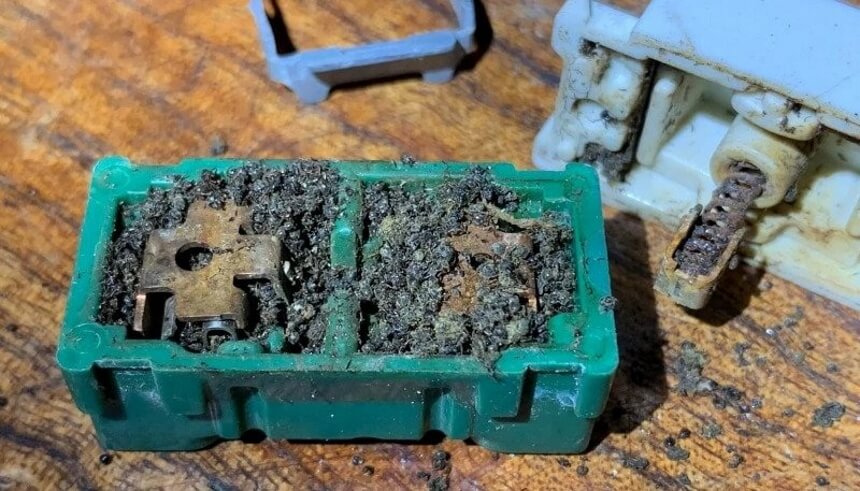
Ants are relentless once their queen has given them orders and will infest transformer boxes, circuit breakers, electric pumps, and telephone boxes. Ants that get an electrical shot release a pheromone that attracts other ants by propping themselves up waving their abdomens in the air. So many ants cluster in a box that it short-circuits. The dirt that ants carry with them is moist enough to short out electricity. Ants can also chew through wire coatings and cause circuits to be short. For detailed information about how to get rid of ants in an outside electrical or transformer box, read this article in Ant Pests. Trusted Source Ants and Electrical Equipment – Ant Pests Ants (Hymenoptera: Formicidae), including the red imported fire ant, Solenopsis invicta Buren, have an affinity for electrical utilities (Drees 1998). In Texas alone, costs associated with fire ant damages to electrical and communications equipment totaled $146.5 million per year. ant-pests.extension.org
If your power goes out, often signified by flickering lights or popping noises, you should immediately shut off the power to the area affected by the ant invasion. Eliminating them yourself only seems to work if you address the problem early. If the ants are piling up behind your walls to the extent that they are shooting out pheromones as they electrocute themselves inside of boxes and walls, it is then time to call in an exterminator. You should then call an electrician to make sure that the ants have not chewed through your walls.
Ants of all kinds, but especially Crazy Ants, love to swarm inside of electronics. According to Live Science Trusted Source Why Crazy Ants Swarm Inside Electronics | Live Science So-called ‘crazy’ ants are spreading throughout the Southeast, and are even more ferocious than fire ants. They also have an annoying habit of swarming inside electronics and destroying them. www.livescience.com , ants track soil into your homes. This soil, intended to build a nest for a Queen, often contains moisture that leaves filthy rust on metal. Imagine thousands of these ants tracking soil and water as they march along wires and pipes. Ants love warm cavities to nest in and often end up inside air conditioners, pumps, dishwashers, and washing machines.
Ants in electric outlets can be banished in three major ways: using pesticides, natural remedies, and eliminating trails.
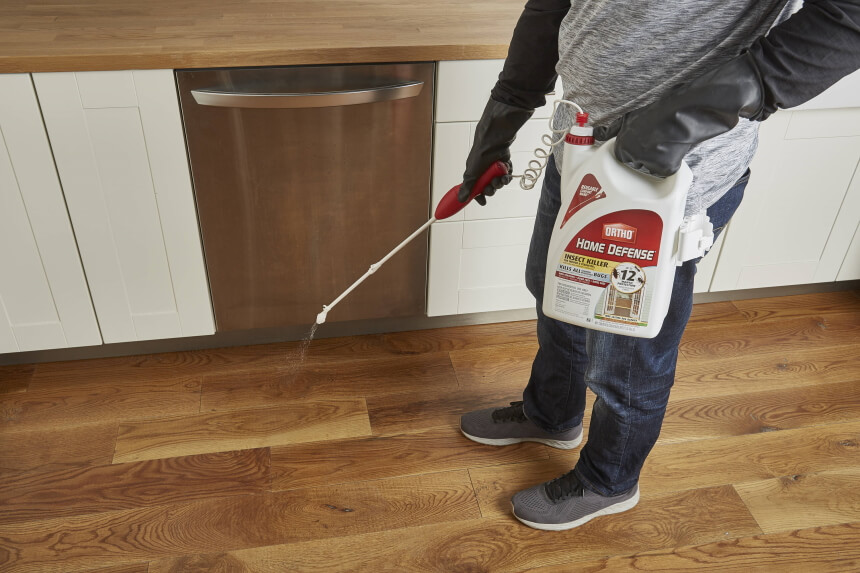
There are some pesticides that are all-purpose and get rid of ants as well as other bugs such as bed bugs, roaches, fleas, and spiders. A product with many good reviews designed to create a barrier between your home and the bugs is Ortho Home Defense Insect Killer For Indoor & Perimeter with Comfort Wand. The Comfort Wand is a good feature that helps to prevent you from getting too close to the toxic chemicals that are going to kill those ants.
If you have multiple pest problems in your home, check out this Top 10 list of pesticides that are used to treat dust mites, bedbugs, lice, and other pests besides ants. Other articles to check out along the same lines are flea traps and the wasp fogger.
There are many natural remedies as well for ant problems, but when it comes to reeking piles of ant bodies and electrical problems, it Is recommended that you use hard-core pesticides to kill them all with one application. It is very easy to become overwhelmed by this problem if the methods you use to kill the nest are only half-measures because dying ants can send out that pheromone that simply attracts more ants to the colony.

There are a few natural remedies that you can try that may act as a deterrent to the ants and that are safer if you have children or pets in the home.
The issue with natural remedies is they are usually not strong enough to kill the ants or destroy the growing nest. However, if you have someone in your family with asthma or a natural illness, you may have no choice but to try these natural methods first. Be aware too that although these are natural remedies, you might still want to be careful how you use them around pets, children, and people with asthma. For instance, essential oils such as tea tree, peppermint, and eucalyptus oils can kill a cat.
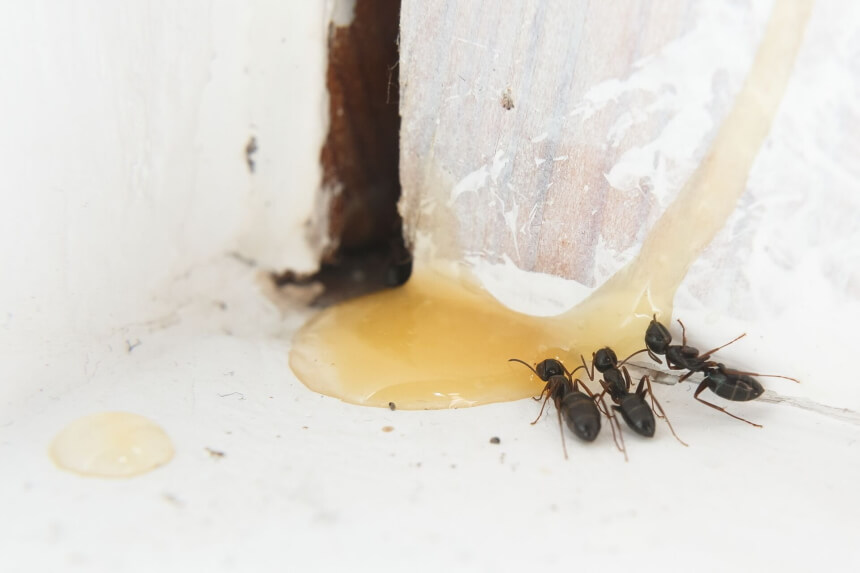
You apply this type of gel along the visible ant trail or inside the electrical outlet, and then when the ants encounter it, they carry the pesticide back to the ant’s nest, where the entire colony is poisoned. GreenWay Ant Bait Gel has many positive reviews, and it is a slow-acting killer that makes sure that every ant in the colony is affected by the poison.
There are more natural ways of eliminating trails, such as squirting a mixture of glass cleaner and liquid cleaner around the perimeters of your home to remove the ant colony’s scented pheromone trail. Yet another natural hack is to pour boiling water along any ant trails and into any anthills that you see outside near your home.
An ounce of prevention is worth a pound of pesticide, so make it a mission to prevent getting ants in the first place by keeping your home spotless, sealing up vulnerable areas, and using repellents to keep the ants away.

If you suspect that you have ants, try to make sure that areas near outlets, electrical boxes, appliances, and water sources are as spotless as possible as ants are attracted to both. Never leave an ant attractant like sugar or honey on your counter. It is also possible that ants are attracted to any fruit that you have in a bowl or in your refrigerator’s crispers.
Be sure to dust your house thoroughly and unscrew wall plates and check inside electrical boxes for any ant bodies. These bodies may still be redolent of pheromones that are attracting even more ants to your home.
Sometimes you are cleaning, and you happen to find a large number of ants or even the nest itself. Pour a box of cornstarch over the ants, followed by a lot of water. This smothers and encases the ants in cornstarch. You can then sweep up the bodies, being sure to relocate them far away from your home.
By the way, if you ever decide to vacuum up ant bodies, make sure the vacuum cleaner bag is disposed of far from your home as well, in case the dead bodies are still emitting pheromones that attract more ants to your home to replace the “lost” members of the ant army.
If you see ants near where you store food, be sure to sanitize the entire area. Ants can be vectors for harmful bacteria such as E. coli, streptococcus, Shigella, Salmonella, Staphylococcus, and other bacterial organisms.
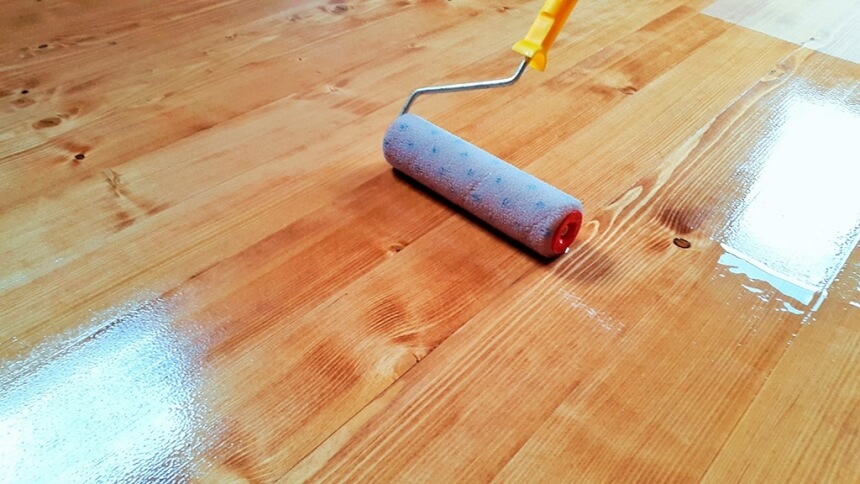
Repair any crack or holes in the walls and run the tape around a baseboard that might not be quite level with space beneath for ants to creep through. If you are not that handy, duct tape is your best friend when it comes to sealing up entry points.
Sometimes the ants have an abundant supply of food outside the home but a lack of water, which causes them to invade your home to find sources of it. Check around your pipes, especially the area surrounding where your pipes enter the home.
According to an article in Healthline about how to kill ants Trusted Source 20 Safe Ways to Kill Ants in Your Home Without Toxic Chemicals When you have an ant infestation, you want to know how to kill ants now. Here are 20 safer ways to try to keep them out today. www.healthline.com you can build a boundary around your home’s perimeter using food-grade diatomaceous earth. It is an irritant, so avoid breathing it in or getting it on your skin. However, it is not a poison but rather a type of silica that carries the fossilized remains of marine animals called diatoms. Diatoms are as sharp as glass, and they are a desiccant as well, so bugs of all kinds dry out or are cut so badly they can’t enter your house.
You can also try sealing your home by varnishing your floors and wood. This is especially effective with carpenter ants that dislike raw wood.

It is made from the gum of the eucalyptus tree. It contains a chemical called PMD, which is classified by the Environmental Protection Agency (EPA) as a bio-pesticide. It is used to repel mosquitos, but there are many reports of it repelling and even killing ants.
Ants are also naturally repelled by certain smells, including cinnamon, lavender, eucalyptus, tea tree oil, and garlic. Ants are also disgusted by lemon oil, so pouring lemon floor cleaner on their trails and where they congregate might help the colony’s dispersal. Be sure to apply all repellents to every point of entry in your houses, such as small cracks, crevices, floorboards, or window sills.
It can be extremely difficult to control ants with natural solutions causing your ant problem to multiply by leaps and bounds as the “hive mind” figures out ways to cheat mass extinction and releases pheromones to draw more ants to the colony. Before you buy a pesticide, be sure to find out exactly how it kills ants, what specific species it kills, and how hazardous it is to any pets, children, or young people in your home. You should also get some professional advice before buying any DIY pesticide solution, as not all pesticides work on all species of ants. This is where it might be of some value to invest in a pesticide that is broad-spectrum and kills all kinds of bugs. Keep in mind that if you use weak solutions or not enough pesticide on an ant colony, it may register the perceived threat and split into two colonies.
